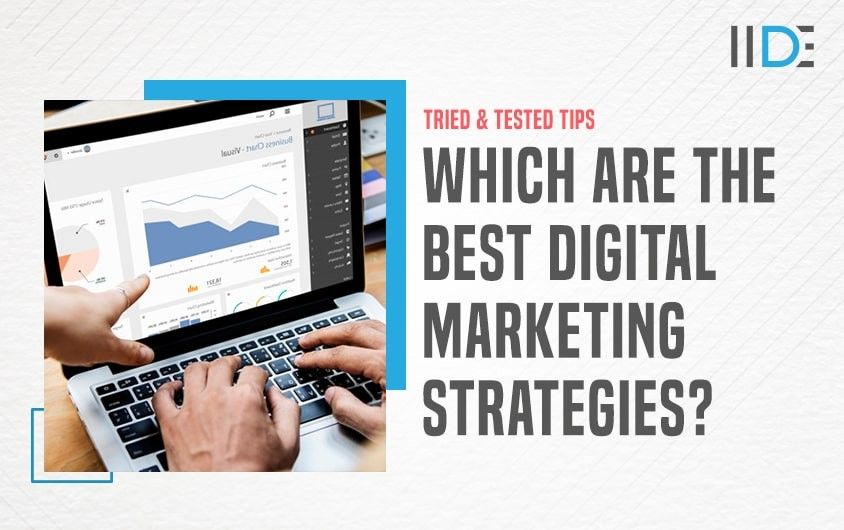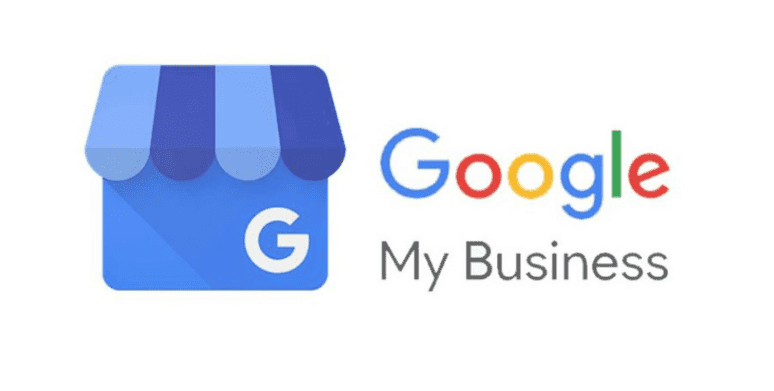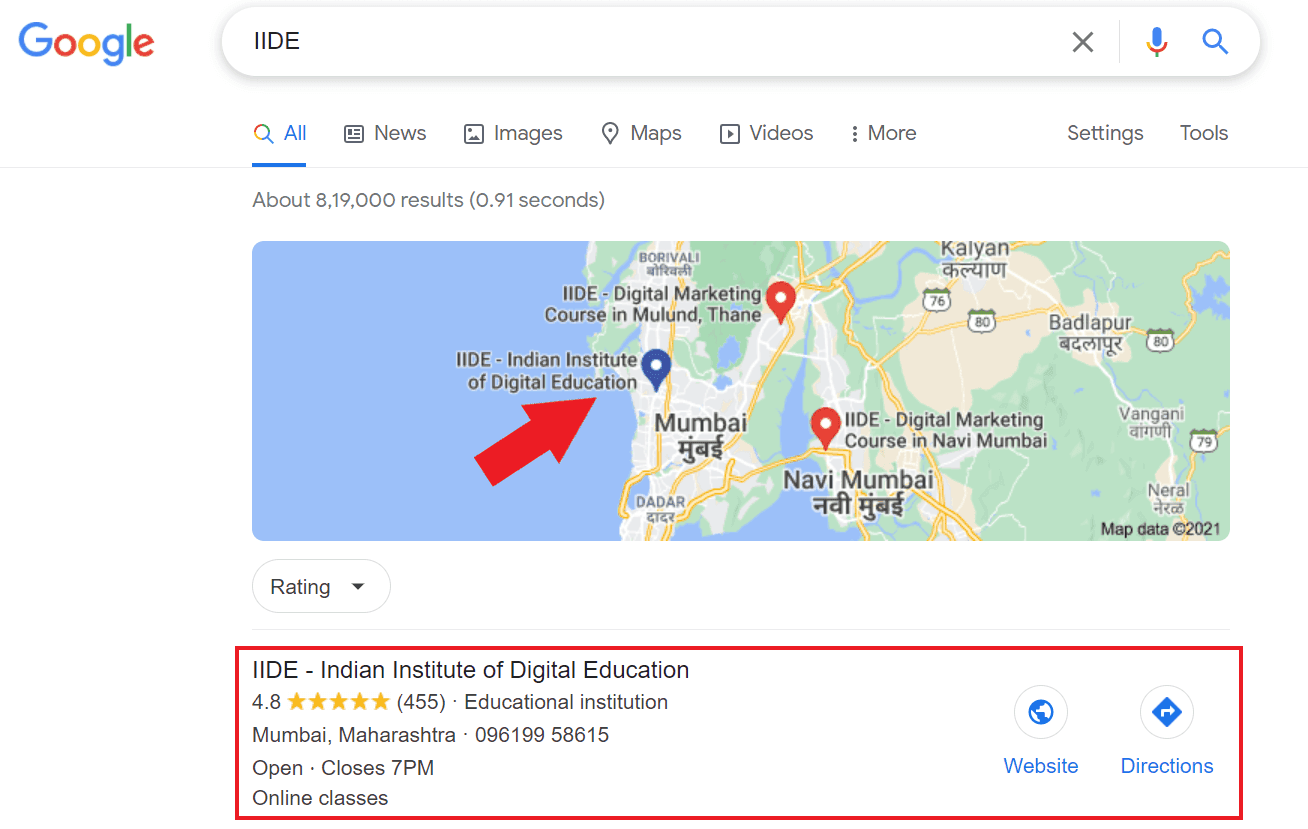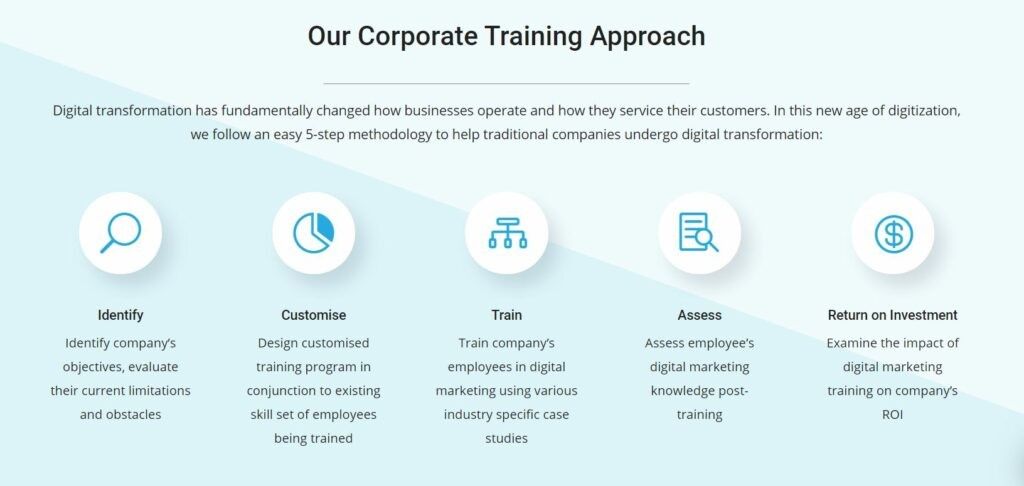
Updated on Sep 25, 2025
|5,623K+ views
Share on:
Implementing effective digital marketing strategies is crucial for business success in today's digital age. Key approaches include developing a quality website, maintaining a strong social media presence, and optimising for search engines (SEO). A well-executed digital marketing plan can increase ROI by 38%, helping companies optimise their advertising spend. Additionally, strategies like remarketing and reputation management further enhance customer engagement and retention, ultimately boosting business growth.
Starting a successful digital marketing journey requires much more than just having an online presence.
It demands creativity, strategic planning, and flawless implementation to craft digital marketing strategies that can double business revenues.
In today’s technology-driven world, where almost everyone relies on the internet to fulfil their needs, mastering the art of effective digital marketing strategies has become essential. And why wouldn’t it be?
Digital marketing has gained significant attention in recent years because it offers incredibly cost-effective methods to advertise products and services.
Its ability to reach targeted audiences at lower rates makes it a game-changer for businesses of all sizes.
Whether you’re a student, employee, entrepreneur, or business owner, upskilling yourself or your team with digital marketing knowledge is now a must.
If you’re a fresh graduate, you can start with an online digital marketing course or even pursue a comprehensive master’s in digital marketing.
For a more professional approach, explore digital marketing corporate training to upskill your employees.
To help you kickstart your journey, we’ve put together a list of top digital marketing strategies to guide you in creating and executing impactful digital marketing plans.
But before we dive into the strategies, let’s first understand the basics of digital marketing strategies and how they differ from marketing tactics.
What Is a Digital Marketing Strategy?
A digital marketing strategy is a blueprint discussing how a business can use online channels effectively to achieve its marketing objectives.
It aims to provide a clear plan that an organisation needs to follow to get maximum returns on the money they spend on online marketing platforms. Some critical components of a digital marketing strategy are:
1. Clear Objective Statement:
It defines the goal of your business. This statement discusses why you want to market your business and what you want to get out of it.
2. Your Target Audience:
This statement identifies whom you want to market your business. Defining your target audience will help you create tailored marketing strategies that will increase the number of revenue and loyal customers in return.
3. Marketing Channel Selection:
This statement defines what marketing mediums you will use for your business. Getting the right marketing channels is crucial as it can help you to get right in front of your audience for effective outreach and branding.
4. Budget Allocation:
Here, you define how much you will spend on online marketing. Allocating the proper budget will help in maximising ROI for the business.
Remember that a well-defined marketing strategy will serve as a roadmap to your business. It will guide you and your team whenever needed to develop marketing plans and help you stand out in this saturated market.
Pro Tip: Looking for creative ways to make money online? There are countless opportunities beyond just YouTube advertising. Discover a range of options and actionable strategies by joining this make-money-from-home free masterclass.
Digital Marketing Strategy Vs Marketing Tactics
Let’s get one thing straight: marketing strategy and marketing tactics are not the same.
A marketing strategy focuses on the “what” and “why”—it’s the big picture outlining your goals and the approach you’ll take to achieve them.
On the other hand, marketing tactics are all about the “how”—the specific steps or actions you’ll implement to bring your marketing strategy to life.
Think of it this way: your strategy defines the plan, while your tactics are the execution. Both are essential, but they serve different purposes in crafting an effective marketing campaign.
Your marketing tactics can include activities like:
- Running social media campaigns
- Doing content marketing
- Doing email marketing
- Running referral programs
- Doing affiliate marketing
Importance Of a Digital Marketing Strategy
A digital marketing strategy is necessary since it gives you a sense of direction, the goals you’ve established and want to reach, and the measures you’ll need to take to get there.
This eliminates the possibility of errors and distractions, allowing you to focus entirely on your objectives.
All team members can focus on the task at hand if they have a well-defined strategy in place. This will help them to work more effectively and productively, enabling them to spend more time perfecting their tasks.
You may also use a structured strategy to track your progress and verify that the plan is followed. Based on the results and goals achieved, changes might be made as needed.
With the right combination of digital business strategies, you can create successful digital marketing campaigns for your business that deliver the best results at the lowest cost.
Also Read: Top 11 Benefits Of Digital Marketing for Businesses & Students
This is why a digital marketing strategy is essential in every business.
Now without further ado, let us look at some tested tips to form digital marketing strategies that will help you plan an effective digital marketing campaign.


Learn Digital Marketing for FREE


8 Effective Digital Marketing Strategies That Work
Often, the digital marketing plan we envision doesn’t connect effectively with our target audience. Frustrated, we end up repeating the process, hoping for better results.
But what we really need is a well-thought-out digital marketing plan, backed by proper research and strategy. To help you get it right, we’ve put together some actionable digital marketing strategy tips to help you grow your business.
P.S. Looking to take things a step further? Check out our digital marketing blogs to discover which of the recommended institutes could be the perfect fit for you.
1. Start with Quality Web and Mobile Sites

In today’s competitive environment, having both high-quality online and mobile sites is critical. And when we say quality, we’re talking about things like speed, design, user interface, and security.
It’s not enough to have a website that just provides information or sells a product or service. Websites must be optimised for both PC and mobile devices, considering mobile devices account for 51% of all internet browsing.
Mobile web design should be simple and responsive, with larger links to account for the fact that customers are using their fingers to click.
So if you’re interested in learning how to create the best sites for your business, we at IIDE have got you covered. We provide an online WordPress course that covers all the necessary topics to help you create an amazing website.
Why should you have quality web and mobile sites?
- Create a positive first impact: If your website runs smoothly, it’ll ease your user journey, foster trust and credibility, and create a positive first impression.
- Reduced bounce rates: If your website visitors can easily navigate your website and find all the information they’re looking for, they won’t leave the website without taking any action. This will reduce the bounce rate of your website and increase the quality score. Low bounce rates will also help you improve your website ranking organically.
- Gives a competitive advantage: In the fast-paced world, a quality website with a smooth user experience and fast loading time will set you apart from the crowd and help you attract and retain customers.
Hey, if reading so far into the blog has ignited a spark inside you to pursue your digital marketing career, then check out this digital marketing course. You never know; it might be exactly what you need.
2. Maintain a Social Media Presence

Although most small company owners recognize social media’s value, it is too easy to overlook it during busy situations. Being realistic about your time for social media is one of the keys to sustaining your social media presence.
An out-of-date social media profile will not be helpful to customers. If you just have time to manage one account, pick a platform that works for your company and stick to a posting schedule.
You can post memes with witty captions to boost your engagement rate with your audience. Posting memes show that you are up to date with current events and know your market and customers. After all, memes are quite popular.
Check Out: How To Use Memes Effectively For Your Brand – Your Complete Guide

It’s important to post regular, focused, and engaging content for your customers so they begin to consider your business an active and helpful source of information.
If you want to learn how to use social media platforms to promote your brand, our online social media marketing course will help guide you through the process. The course covers all the topics and tools needed to build an effective social media strategy.
Why you need to maintain a social media presence:
- Cost-effective marketing tactic: Creating a social media page or posting content related to your business without specific targeting is free. Compared to different marketing channels like traditional media or paid online ads, maintaining a social media presence is inexpensive and caters to a large audience while contributing to community building.
- Improves SEO efforts: SEO is all about organic marketing. The likes, comments, or shares you get on your posts are social signals that will positively impact your SEO efforts.
- Driving website traffic: Social media often lets you add links to your posts. A strategic and well-thought social media post can drive traffic to your website.
3. Consistent Online Reputation Management Campaigns

You must always try to ensure that your internet reputation is favourable to offer a positive picture to clients.
You’ll need to establish and manage your company listing on review sites like Google Maps and Yelp and your social media profiles.
This is an important aspect of your online reputation management strategy. Today’s referrals are customer reviews. If you discover a consumer has written a bad review, reply promptly and courteously on the site to address the client’s concern.
This will show the existing customer, as well as other potential customers, that you care about your customers and work to correct any issue that may arise.
Why you need to be consistent with ORM:
- Helps in customer retention: Customers are king, and grievances must be addressed adequately. Solving your customers’ problems will foster positive customer relations and increase your business’s customer retention rate.
- Influence customer decision: People search for reviews and feedback before buying. A robust and positive online reputation can help you attract more customers to your business.
- Improves online visibility: Positive feedback from your existing customers will indicate that you’re a credible business, enhancing your search engine rankings.
4. Make Use Of Remarketing

After setting up your website and social media accounts, you can use targeted online advertising to increase visitors to your site. Once you identify the potential customers from these visitors, set up a remarketing campaign using Google Ads and Facebook Ads.
If you want to learn more about remarketing, we’re listing down a few blogs that will guide you in understanding, planning, and implementing an effective remarketing strategy.
- Why Remarketing Is An Important Technique
- Guide to Custom Remarketing
- Introduction to Facebook Remarketing
With the insights above, you can effectively target your preferred demographic while maximising your marketing budget. Want to dive deeper into how remarketing works? Explore our online Facebook & Instagram ads course and master the art of reaching the right audience at the right time!
Why you need remarketing:
- Tap onto lost opportunity: Remarketing helps in getting to the audience who are already aware of your business or have interacted with it at some point in time. This is an ideal opportunity for you to bring them down to your marketing funnel and convert them into paying customers by creating a FOMO, giving out special discounts, sending out personalized messages, etc.
- Increase conversion rates: Repeated exposure to the brand name can persuade conversion to buy from the business. It also enforces brand awareness and creates a space in your consumer’s minds when they think about any problem that your business can solve.
- Optimizes your ads spend: Remarketing targets warm audiences, meaning that they might convert into paying customers. This helps you allocate your budgets in a better way and ensures that you get good ROAS.
5. Focus On Google My Business

Make it simple for visitors to discover your company by using a service called “Google My Business”.
This service will help you create and verify your brand/business, so your business information can be shown on Google Maps.

This is a crucial step because when customers search for your business, Google will display all of your contact information, including your location. This can assist potential consumers in contacting and navigating your business.
Why you need Google My Business:
- Give real-time updates: Managing a Google My Business profile is easy. It allows you to post real-time information so that it’s easier for users to make an informed decision.
- Get a chance to interact with your customers: GMB allows customers to post reviews and feedback. It opens a two-way communication where you can reply to their feedback as well.
- Builds credibility: Listing your business on GMB indicates that you’re a Google-verified business. Seeing your business name with a brand like Google creates a sense of security among the viewers.
6. Make the Buyer’s Journey Smooth

Understanding the buyer’s journey is crucial to knowing what to communicate with consumers at every stage of their transaction.
When it comes to analysing buyer behaviour, you have access to a wealth of comprehensive tools and insights.
With tools like Google Analytics, you can track every step a visitor takes on your website—how long they stay on each page, which pages keep them engaged, and even which ones lead them to leave.
Key metrics such as bounce rate, session duration, and pages per session provide valuable insights into your website’s performance.
By analysing this data, you can identify areas for improvement and tailor your digital marketing strategy to meet the needs of potential customers more effectively.
If you’re new to Google Analytics or want to refine your skills, our online Google Analytics course, guided by a professional trainer, is the perfect way to get started. Learn how to harness this powerful tool and optimise your website for better results!
Why you need to make the buyer’s journey smooth:
- Creates positive brand image: If your buyer’s journey is smooth, i.e., if you’re able to help your customers navigate smoothly, they’re going to be happy. Remember, a satisfied and happy customer is a significant resource for any business as it creates a positive brand image, contributing to repeated and new customers.
- Contributes to quick decision-making: If the visitors are happy with what they see, they’ll likely buy from you. A smooth customer journey eliminates friction between the business and the website, facilitating quick decision-making among the viewers.
- Increase in customer retention rate: Customers return to businesses where they had a good experience. Returning customers increases the business’s retention rate.
7. Have an SEO plan in place
SEO is all about the game of keywords. It helps you get organic traffic by using the right set of keywords and maintaining good SEO practices to rank at the top of the search engine result page.
Marketers can use content marketing, optimizing the website for search engines and using meta descriptions to get a high ranking on SERP.
Why you need to have an SEO plan in place:
- Complements other marketing tactics: Gone are the days when paid media was used to gain customers. Adding SEO is a crucial step for creating effective digital marketing strategies. It creates a balance between paid and organic tactics, resulting in more leads and conversions.
- Quick adaptability: SEO is flexible and it’s easy to make and implement changes in SEO plans that help adapt marketing trends quickly and get quality results in return.
8. Effective use of email marketing:
Email marketing is about sending promotional emails to your email subscribers or potential customers to get conversions. It helps you stay in touch with your users and covers one of the most crucial marketing mediums for your business.
Email marketing can include promotional, deals-related, or informative messages that can keep the audience glued to your business.
Why do you need email marketing:
- Integrated Marketing Campaigns: Email marketing goes well with different marketing mediums with a cohesive and synchronised approach.
- Measurable ROI: Email marketing provides measurable ROI through advanced analytics, offering insights for data-driven decision-making in your online marketing strategy.
Also, Check Out: 11 Best Digital Marketing Courses
Now that we’ve covered the digital marketing strategies that every business should have, let’s examine some recommendations.
Tips to Form Effective Digital Marketing Strategies
We’ve discussed how critical digital marketing strategies are to a company’s success. With the correct tactics, they can greatly assist you in growing your firm.
We are all aware that the ultimate objective of that company is to grow sales and profits. Now, in order to accomplish this, you’ll need a method that will help you keep track of the steps you’re taking so you can stay focused on the task at hand and avoid deviating from it.
- The first step is to establish a goal. Before strategizing, you must ask yourself what you hope to accomplish. Although this sounds simple, it can be daunting, so we suggest you follow the “SMART” Criteria.
SMART is a very helpful and commonly used mnemonic tool for setting objectives.
The acronym SMART stands for:
– Specific
– Measurable
– Attainable
– Relevant
– Timely Goals
While planning, you must always have 2-3 plans devised and then study them carefully and decide which works best for you. Also, your strategy should be a perfect mix of different digital marketing elements. Once your strategy is in place, comes the next step.
- The second step is to ensure there’s open communication between all the team members involved in the strategy. It’s vital to make sure that everyone in the team is briefed on their tasks and what they need to do to achieve them.
- Having a goal in mind will give the whole team clarity in what they have to aim towards.
- The next stage is to maintain track of your progress towards your goals. You need to ensure that the team is following through with what was discussed during the second step.
- This is important because it helps to encourage the team to focus on what needs to be done if the targets aren’t being met or if they’re diverting from the current tasks.
- The final stage is to analyse the results of the outlined strategy. This will give you a better understanding of what you have achieved and the targets your team has met.
- As a result, after receiving the data, the team will need to discuss future tactics. This is significant because they will have a greater knowledge of what works and what doesn’t and can tailor the following digital approach appropriately.
That’s all you need to know to develop a successful digital marketing strategy. We hope this article helped you gain a better understanding of the topic.
We understand that it may get a little overwhelming to begin with, but with the right professional help and guidance, like you’ll get in an MBA in Digital Marketing can also provide you with a wide range of career opportunities, equipping you with the necessary skills, you will be able to start in the right direction.
IIDE offers 360-degree customized digital marketing corporate training, which has been crafted by industry specialists to help you grow your business.

As we’ve seen over the previous year, a solid digital marketing strategy is the only way for a business to flourish in today’s digital world.
Volkswagen, Abbott (a well-known pharmaceutical firm), Asian Paints, L&K Saatchi & Saatchi, Mahindra and Mahindra Rise, Cipla, and other companies have benefited from our corporate training program.
If you want to digitally transform your business, write to us for a personalised demo today!
Must Read: Do’s & Don’ts of Digital Marketing
In the comments area below, let us know what you think about this. We’d be delighted to hear from you.
Want to Know Why 2,50,000+ Students Trust Us?
Dive into the numbers that make us the #1 choice for career success

MBA - Level
Best For
Fresh Graduates
Mode of Learning
On Campus (Mumbai & Delhi)
Starts from
Mar 2, 2026
Duration
11 Months
Live & Online
Best For
Working Professionals
Mode of Learning
Online
Starts from
Feb 20, 2026
Duration
4-6 Months

Online
Best For
AI Enthusiasts
Mode of Learning
Online
Duration
5 Months

Offline
Best For
12th Passouts
Mode of Learning
On Campus (Mumbai)
Duration
3 Years
Recent Post
Digital Marketing Courses Nearby
You May Also Like
A digital marketing strategy is a comprehensive plan that outlines how a business will use online channels to achieve its marketing goals, including brand awareness, customer engagement, and increased sales.
A strategy is the overarching plan guiding the approach to achieving goals, while tactics are the specific actions taken to execute the strategy.
A well-structured strategy provides direction, helps businesses stay focused on their goals, and ensures resources are used efficiently for maximum return on investment.
SEO is essential for driving organic traffic by improving website visibility on search engines, increasing both customer engagement and conversion rates.
A consistent and engaging social media presence builds brand awareness, fosters customer relationships, and can direct traffic to a business’s website, improving its overall reach.
Remarketing targets users who have previously interacted with a business, increasing the chances of conversion by re-engaging them with personalised messages and offers.
Effectiveness can be measured through analytics tools, tracking metrics like website traffic, conversion rates, and return on investment (ROI) from different campaigns.
Kartik is a certified digital marketer and an experienced marketing trainer with a strong passion for imparting knowledge in the field of digital marketing. As a marketing leader, he brings expertise in SEO (Search Engine Optimization), ASO (App Store Optimization), Website Development & much more. His curiosity and commitment to staying updated with industry trends have made him a dedicated digital marketing educator.
Kartik's dedication to teaching has led him to train over 35,000 students globally. His students range from engineers, MBA graduates, start-up entrepreneurs, marketing managers, and even those new to the world of digital marketing. His sessions have reached learners across India, Canada, Dubai, the USA, and other parts of the globe.
Kartik is committed to helping students and professionals alike understand the complexities of digital marketing, empowering them to advance their careers and businesses in this dynamic industry. His deep knowledge and practical approach have earned him a reputation as top 1% digital marketing trainer.